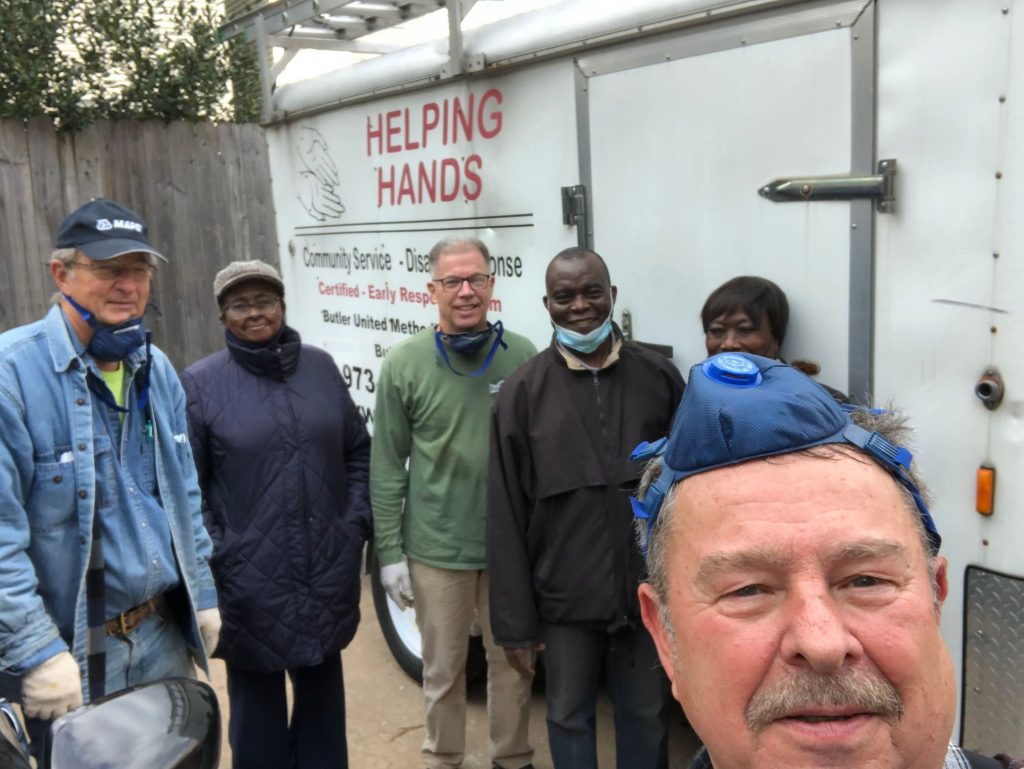You are the light of the world. Let your light shine before others, that they may see your good deeds and glorify God in Heaven.–Matthew 5:14-16
As Hurricane Ida ripped apart houses in southern Jersey and flooded out cars and buildings in the north, many others slept peacefully never knowing what destruction the storm had caused overnight. Abandoned cars, downed trees and several feet of water in basements were left in her wake. Unlike superstorm Sandy that covered swaths of areas, Ida dug her way into pockets of neighborhoods, many of which were in hidden in urban areas like Newark, Jersey City, Paterson and Roselle Park. The news coverage was sparse and short lived.
But in the early morning hours of September 2, we saw GNJers step out to offer a lending hand. Centenary UMC rolled up their sleeves to help their neighbors pick up the pieces caused by the tornadoes and opened up their building to a local food pantry. Others helped muck out the UMC of Bound Brook who had just finished rebuilding what had been demolished during superstorm Sandy. Still others started food and clothes drives and opened their doors to those who needed a safe, dry place to sleep.
As United Methodists, we are taught that everyone is a neighbor and that we should be lending a hand and heart to all our neighbors. Right now, our neighbors really need our help. From broken boilers and electrical panels to growing mold and broken walls, more than 20 of our churches and some of their communities are overwhelmed by what the journey ahead looks like.
Even though the damage may not be visible because it’s hidden in basements or the consequences of water that has already receded, the need is real in those 12 NJ counties declared as disaster areas, and the volunteer assistance that was available after superstorm Sandy is now being spread out over 70 areas in the United States also declared as major disaster areas. More than 75,000 people applied for assistance from FEMA.
“The impact may not be visible to anyone else, but Greater New Jersey has not forgotten them, and A Future With Hope has not forgotten them,” said Andrea Wren-Hardin, GNJ’s disaster relief coordinator and a Hope Center developer who brings extensive experience in case management and community engagement to this role and has proven time and time again that she is committed to helping others and being the hands and feet of Jesus, whether they are at-risk youth as a Court Appointed Special Advocate or leading a team in Haiti to foster healthier communities.
The Ida Road to Renewal Fund from A Future With Hope is a way to get those impacted by the first major disaster declaration since Sandy the sustainable help they need, so that for some, they are able to resume important ministries and missions, and for others, so that they can go home.
“It’s about being efficient without duplicating services to those who need them, plus being effective so families can actually go home,” said Wren-Hardin, who was an active volunteer in the aftermath of Sandy as a member of Morrow UMC and has been instrumental in providing relief as a member of NJ Volunteers in Mission.
Wren-Harden emphasized the need for more collaboration and coordination with partners like NJVOAD (NJ Voluntary Organizations Active in Disaster), which for more than 30 years have been providing preparedness, resilience, response or recovery.
GNJ is grateful for the volunteers who have stepped up and said I want to help during what continues to be a challenging time. Volunteers like Butler UMC have started mucking out buildings, but we’re only in the relief stage. We still have the rebuild, recovery and renewal stages to get through, and what we’re seeing is that our churches and communities are just not going to have the money they need to make this happen. Walls need to be rebuilt; boilers need to be replaced; and electrical panels need to be fixed.
One hundred percent of the Fund’s proceeds will go toward program goals and direct assistance to communities in need. Those program goals for 2022-2023 include:
- Engage 200 households to help them complete their recovery
- Repair 50 homes
- Engage nearly 2,000 volunteers to be able to do the work with nonprofit builders
“As United Methodists, when we see people in need and we know people are in need, it calls us to respond because that’s what we do as United Methodists, and the Ida relief fund is part of that,” said Wren-Hardin. “The Fund will use all of those resources to help them go home and have a new normal in the near future.”
“What I love about the United Methodist Church is that it grows our faith and our relationship with God to inform how we act in the world and to inform how we engage and treat others, and that we build our relationship with others because we have a relationship with God who loves us.”

